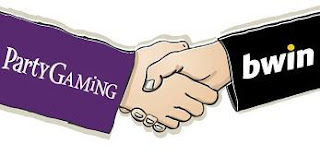PartyGaming and Bwin Merge
 I had a brief email exchange with a representative of PartyPoker this week. In my message, I signed off saying “Interesting times for PartyPoker, wouldn’t you say?” My correspondent readily agreed.
I had a brief email exchange with a representative of PartyPoker this week. In my message, I signed off saying “Interesting times for PartyPoker, wouldn’t you say?” My correspondent readily agreed. What’s so interesting about PartyPoker right now?
Well, first of all, whenever there is any legislative news over here in the U.S. regarding online gambling, we are reminded that PartyPoker pulled out of the American market immediately after the Unlawful Internet Gambling Enforcement Act of 2006 was signed into law (in October 2006), ostensibly to be in a position to return should the UIGEA be overturned or replaced by new online gambling legislation.
So when the House Financial Services Committee last week passed Rep. Barney Frank’s Internet Gambling Regulation, Consumer Protection, and Enforcement Act (H.R. 2267), one of the various sidebar stories was again the possibility of PartyPoker perhaps one day getting itself a license and returning to the U.S. market.
Of course, one imagines that day -- that is, the day when the feds start handing out licenses to companies wanting to set up online gambling sites in the U.S. -- won’t be coming for a long, long time (if ever). This article over on ABC News about the bill passing through the House Financial Services Committee did a better job than some (I thought) of reporting on the relatively slim likelihood we’ll see online gambling licensed and regulated in the U.S. in the near future: “Internet Gambling Legalization Seen as Long Shot.”
Another reason why these are interesting times for PartyPoker is the recent announcement of PartyGaming having merged with Bwin Interactive Entertainment. When the merger is completed in early 2011, the new company will instantly become the world’s largest online gambling company.
Rumors about the merger -- a deal valued at a whopping $1.76 billion by some estimates -- have been circulating for many months. Indeed, it was last December that articles began appearing in London newspapers about the possibility of PartyGaming and Bwin getting together, although both were officially denying anything was in the works then.
Most industry observers have long suggested the two companies make for a good fit, with PartyGaming having long focused on poker, bingo, and casino games while Bwin is a leader in sports betting. Their respective markets (i.e., their player pools) also apparently don’t have too much overlap either, having respectively concentrated on different parts of Europe.
The new company will apparently have a new name, and I believe its headquarters will be over in Vienna, Austria (although still will be traded on the London Stock Exchange). The merger is still subject to both companies’ shareholders’ approval (75% have to say it’s okay), although both PartyGaming and Bwin saw their stock go up something like 25% in value as soon as the merger was announced last week, so it is thought the shareholders will likely be on board.
As far as poker is concerned, the new company will enjoy a huge player base and be able to compete with PokerStars and Full Tilt Poker over in the European market. One analyst, Gianmarco Bonacina, noted how in terms of poker the merger was “both an offensive and a defensive move.”
“In Europe, Bwin and PartyGaming are losing market share in poker versus Pokerstars and Fulltilt, so the combination will protect them,” said Bonacina. Meanwhile, “in the U.S., the move is offensive. They want to attack that market and are in a better position if they combine.”
As far as plotting some future invasion of the U.S. market goes, I’m still not too sure about how easily any current online poker site -- all of which are necessarily based outside of the U.S. -- is going to get a license here to operate should the legislation ever make its way through both houses, get signed by the president, then have its regulations finalized and implemented.
First of all, there are those two so-called “bad actors” amendments (here and here) which got added to the current version of the bill. Sites like PokerStars, Full Tilt Poker, UB, and others may or may not have to worry about those, but who knows?
Then there’s also that other amendment added by Rep. Brad Sherman (D-CA) that insists applicants for licenses have “established a corporate entity or other separate business entity in the United States, a majority of whose officers are United States persons and, if there is a board of directors, that the board is majority-controlled by directors who are United States persons.”
That one makes me wonder about how simple a process it’ll be for, say, PokerStars, Full Tilt, or even the new Party-Bwin combination to come into the U.S. and get a license to operate an online gambling site. I suppose new companies, based in the U.S. and run by U.S. folks, could be created from these existing sites, but then to what extent do those new companies get to take advantage of the market share currently enjoyed by the sites?
In other words, I readily see how the merger of PartyGaming and Bwin works as a “defensive” measure designed to help both companies compete for the online poker market in Europe. But I’m not quite sure how it is going to work as an “offensive” move here in the U.S. Not yet, anyway.
Interesting times, then, both for PartyPoker and for online poker, generally speaking. Although I have to admit when it comes to looking ahead and trying to speculate about what’s to come, it’s hard to be more specific than that.
Labels: *the rumble, Bwin, PartyGaming, PartyPoker














0 Comments:
Post a Comment
<< Home